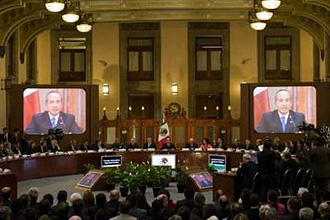
|  |  |  News Around the Republic of Mexico | August 2008 News Around the Republic of Mexico | August 2008  
Mexicans Take Hope From Anti-Crime Summit
 Mark Stevenson - Associated Press Writer
Associated Press Mark Stevenson - Associated Press Writer
Associated Press
go to original


| | Screens show Mexico's President Felipe Calderon (C) delivering a speech during a national security meeting at the National Palace in Mexico City August 21, 2008. Calderon, who has come under heavy pressure to stamp out violent crime, hosted the meeting of security chiefs, state governors and lawmakers. He pledged to build two new high security prisons with special wings for kidnappers. (Reuters/Jorge Dan Lopez) | | |
Mexico City - Mexico's plans to move suspected gangsters to high-security prisons and establish a national identification card drew praise Friday, with many saying authorities are finally taking serious steps to stem a wave of crime.

Optimism has been rare in recent months, as the death toll rises almost daily in drug turf battles and in brutal kidnappings — including that of Fernando Marti, the 14-year-old son of a prominent businessman whose death at the hands of his captors led the government to hold a national anti-crime summit Thursday.

"Finally, they are taking this seriously," said 54-year-old Mexico City businessman Juan Cornejo. "We are sick of the way things seem to be out of control."

In an apparent reference to the highly publicized Marti kidnapping, Attorney General Eduardo Medina acknowledged on Friday that "perhaps it takes emblematic events to make us realize that the government is far from living up to its obligations."

The newspaper El Universal noted in an editorial that earlier anti-crime plans have fallen short because of disorganized or corrupt police forces and the antiquated judicial system. "But this time, there is growing social pressure, and it appears to have a focus," the editorial said. An anti-crime march is scheduled for Aug. 30 in Mexico City.

Ana Maria Salazar, a former U.S. defense official and Mexican political analyst, said the meeting was an important step.

"The bottom line is coordination between the states and federal government, and maybe this is going to be the catalyzer," she said. "There's enough political concern that they're going to sit down and figure out a better way to coordinate."

Rene Jimenez, who researches crime, said the plan "could be effective if there is the political will to do what needs to be done." He pointed out that some questionable union leaders and governors with major scandals in their home states signed the anti-crime accord, and said that if the plan is to be effective, they would have to be investigated, too.

More then 4,000 people have been killed in drug-related violence since President Felipe Calderon launched a crackdown on gangs nearly two years ago.

The plan calls for transferring all organized-crime suspects to high-security prisons within 30 days and building more such facilities. A new, more secure national identification card would be introduced within three years.

Other improvements include a single, nationwide emergency number for reporting crime and a national database of cell phone users.

The plan also calls for increased testing, training and vetting of Mexico's approximately 376,000 police officers. |

 |
|  |



